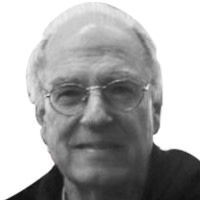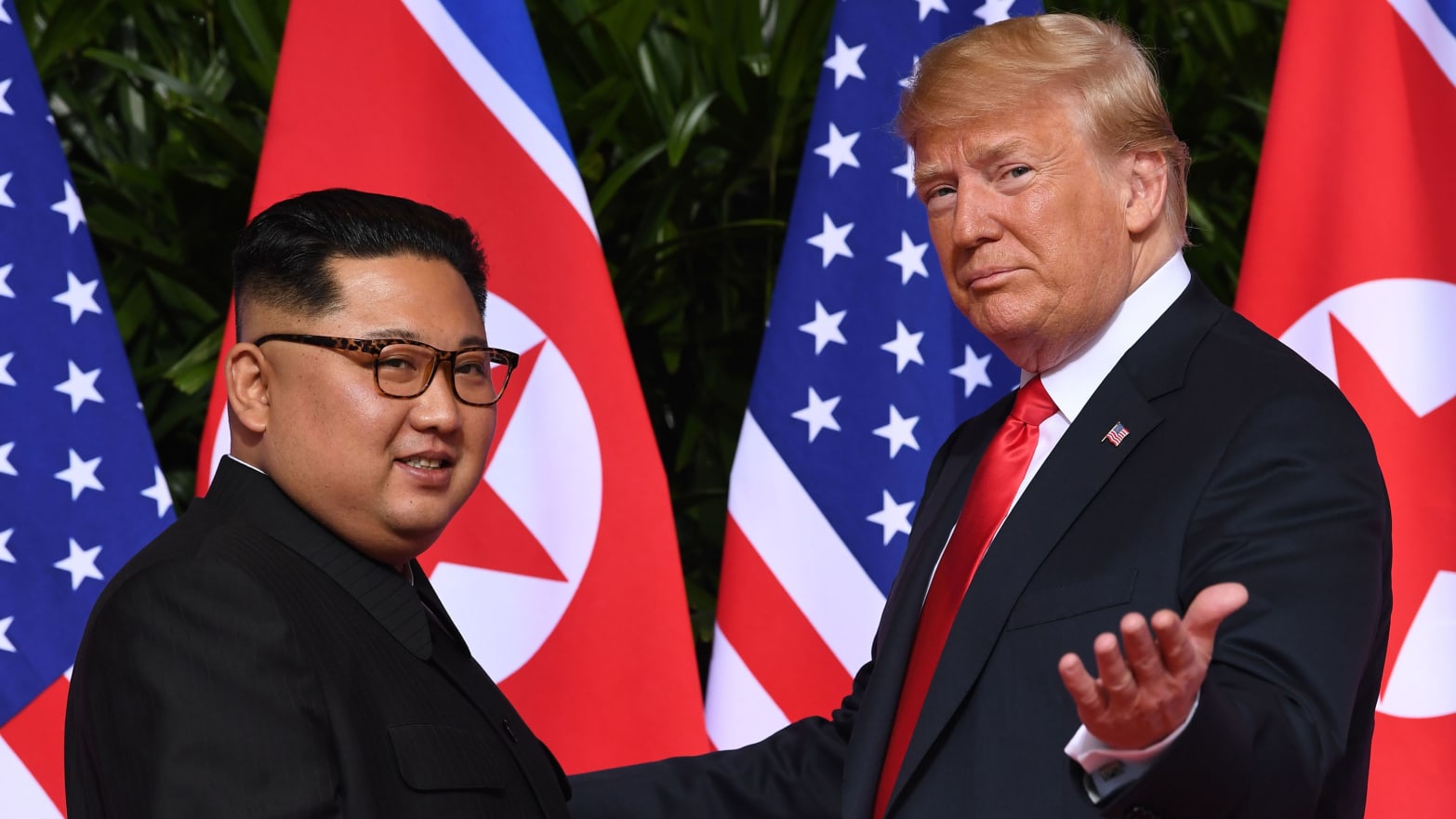HANOI—If President Donald Trump thinks his second encounter with North Korea’s Kim Jong Un is going to be “very tremendous,” as he put it in a typical burst of self-praise, he had better think again.
Deep in the Kim Dynasty DNA is the belief that the North can use its possession of nuclear weapons and the threat of their use for diplomatic and political purposes on the road to control of the entire peninsula. And before that happens the North would be holding up South Korea for enormous economic aid, beginning with a revamped rail system and reconstruction of dilapidated factories.
So, as Kim and his tough top adviser, Kim Yong Cho—plus his charming kid sister, Kim Yo Jong—arrived here after riding through China in an armored train, and a final 108-mile motorcade ride from the border, there was no sign the North Koreans had any notion of real concessions when Kim and Trump meet Wednesday and Thursday.
While Trump was flying here from Washington, envoy Stephen Biegun was still sorting out whatever his boss and Kim might agree on. No one was betting on Biegun—and then Trump—coming up with much beyond face-saving minor points of agreement that won’t guarantee North Korea is getting rid of its nukes and the missiles to carry them to distant targets, including the continental United States.
The most enduring lesson from the first Trump-Kim summit in Singapore is clear: beware of any deal with the North Koreans.
One example: Kim’s agreement in Singapore to return the bones of U.S. troops long missing on North Korean battlegrounds. After much delay, the North last July finally transferred some 50 “sets” of remains — just a fraction of hundreds they’re holding in reserve as needed for future signs of supposed rapprochement.
What Trump took away from Singapore were mainly bragging rights as a self-proclaimed peacemaker, while Kim—the murderous dictator of one of the world’s most repressive and isolated regimes—burnished a new image as a respectable leader shaking hands with the president of the United States.
Here in Hanoi, Kim spent the day prior to the summit resting up from traveling 70 hours to get here and then touring the city in an armored limousine on his way to the North Korean embassy surrounded by a retinue of dark-suited bodyguards. Authorities meanwhile were taking no chances on any incident ruining the mood.
The rail station at the Vietnamese border town of Dong Dang where Kim’s armored train arrived Tuesday morning was under heavy guard as he was greeted by rows of soldiers and dignitaries. The highway from the border was closed to all traffic, and shops and clubs near the Melia Hotel where Kim is staying were under a tight curfew.
This time around, no one other than Trump is predicting the summit will end in a blaze of success—or that Kim will ever do away with a nuclear program seen as his ultimate defense and deterrent against enemies near and far.
North Korea’s emergence as a nuclear power has been the hallmark of Kim family rule ever since Jong Un’s grandfather, regime founder Kim Il Sung, faced the U.S. in the first North Korea nuclear crisis during the early 1990s.
Three months after Kim Il Sung’s death in 1994, a deal signed in Geneva promised the North twin nuclear energy reactors while requiring it to shut down the plutonium reactor at its nuclear complex at Yongbyon, 60 miles north of Pyongyang. That agreement blew apart eight years later after revelations of the North’s secret program for making nuclear weapons with highly enriched uranium.
Harking back to that deal, Choi Jin-wook, former head of South Korea’s Korea Institute of National Unification, says North Korea “should be given the peaceful use of nuclear energy and it should be monitored and verified forever.” Anything else, he said, “is only a temporary stop and will come back as a more dangerous situation.”
But for all Trump’s tiresome talk about unprecedented breakthroughs, we are a long, long way from anything like the Geneva agreement reached during the presidency of Bill Clinton, which did last for most of a decade.
The North, having conducted its first nuclear test in 2006 at the behest of Kim Jong Un’s father, Kim Jong Il, now has the nukes it only lusted after 25 years ago.
Today, debate revolves around getting North Korea to list all its facilities for making nukes and missiles, shut them all down and give up the few dozen warheads it’s got. The most obvious bargaining chip for the U.S. is relief from US and UN sanctions imposed after Kim ordered tests of nukes and the missiles for firing them as far as Washington D.C. in 2017.
After ignoring or responding in kind to Trump’s threats of fire and fury throughout that year, Kim stopped testing when he concluded his missiles were able to do the job of hitting the U.S. mainland with nuclear warheads, and therefore would deter any future attack. Lurking behind the Trump wish list is the overwhelming fear that Trump will make concessions, including sanctions relief, without Kim taking seriously verifiable steps toward ending North Korea’s proud claim as the world’s ninth nuclear power.
Probably the easiest deal he could make would be to sign off on an end-of-war declaration, declaring the Korean conflict that ended in a truce in 1953 is really over. That step, already contemplated in the Singapore statement, is widely seen as leading to intensified North Korean demands for a formal peace treaty and withdrawal of America’s 28,500 troops from South Korea.
If that were to happen, South Korea would lose the guarantees to which it has long been accustomed under the U.S.-Korean alliance. The American troops were never intended to act as the decisive military force, rather as “a trip wire,” as the Americans often put it, against aggression from the North that would put the South at risk—and invite immediate U.S. retaliation.
“Even if the U.S. and North Korea reach a nuclear deal in Hanoi, the U.S. army must remain in Korea for an indefinite period,” says Michael Shim, a businessman in Seoul. “Korea feels vulnerable from its neighbors, China Russia and Japan, and the U.S. army presence has been a great source of comfort.”
That view resonates among many analysts following the ups and downs of South versus North Korea.“I'm profoundly concerned about what Trump may say, do and agree about North Korea in Vietnam,” said David Straub, former political counselor at the U.S. embassy in Seoul. “The U.S. goal on the Korean peninsula has been not to threaten North Korea but to protect the South from North Korea, which ultimately wants to control the entire peninsula.”
For the North, “nuclear weapons are just one more means—but a critically important one—of achieving their ultimate goal,” said Straub. “By that, I don't mean that North Korea intends to attack either the U.S. or South Korea with nuclear weapons. Rather, the North intends to continue to use its possession of nuclear weapons and the threat of their use for diplomatic and political purposes on the road to control of the entire peninsula.”
In other words, while the U.S. and South Korea are plying the North with economic aid and expertise, North Korea would go right on chipping away at the U.S.-South Korean alliance, calling for withdrawal of ever more U.S. troops, holding up its nukes as a club over the South.
“We know we can defeat them with conventional arms,” a retired South Korean diplomat told me. “We have no defense against their nuclear program. That is why we need complete denuclearization.”
Like many in Seoul and in Washington, Straub sees Trump as “clueless about all this” while using the nuclear issue “to boost his brand”—indeed maybe to win the Nobel peace prize the White House asked the Japanese to nominate him for—and “improve his odds of reelection.” Straub predicted Kim will “flatter Trump personally and give him apparent concessions and ‘successes’ so he can crow about what a great ‘dealmaker’ he is.”
That supremely skeptical view is most loudly heard on the streets of Seoul, where several thousand right-wing demonstrators parade every weekend waving both American and South Korean flags. “Freedom is not free,” said a banner hoisted high by rightists at the head of the march last Saturday. “Let’s kick out the communists,” said another.
“Kim Jong Un is playing Trump,” said one middle-aged spectator at the demo. “There’s no progress. North Korea didn’t change at all.”
Trump in the past few days has tried to inoculate himself against such criticism by saying, no, he’s not so naïve as to be expecting “complete denuclearization” when he sees Kim.
"I'd just like to see, ultimately, denuclearization of North Korea," he remarked, but why worry about a time schedule? “As long as there's not testing, I'm in no rush," he said, and meanwhile, "I hope that very positive things are going to happen."
But “not testing” is not a big deal. No other country has tested nuclear weapons in this century. The mere fact that the North Koreans have stopped testing for a time is hardly proof positive that they are not ready to deploy them for real—or test again just to prove they can do it.
Joel Wit, director of 38 North, a Washington think tank that follows very closely what’s going on in North Korea, thinks that for all the potential pitfalls and undue hype negotiations have to help.
“I am not optimistic, I am not pessimistic, I am going to be realistic,” Wit remarked in a talk at the University of North Korean Studies here when asked if he believed the North would finally denuclearize. “The only way to find out is to work with them.”
Wit dismissed the notion that the U.S. was playing into North Korea’s hands by talking. Rather, he said, “We should play into every opportunity to move down the denuclearization road… Our ability to protect, defend ourselves has not been diminished.”
And he had a ready answer to widespread criticism heard in Seoul that the summit may end in “a small deal” in which Trump and Kim agree no more tests of nukes and long-range missiles that might endanger the U.S. but forget about short and mid-range missiles ready to unleash nukes on South Korea.
“If that kind of deal did happen, if combined with measures to stop making fissile material, North Korea would not be expanding as a nuclear threat,” he said. “That’s a positive step in the right direction.”
One topic that’s also a matter of deep concern in Seoul is whether Trump will ask Kim about the North’s record on human rights in which millions, herded over the years into a vast gulag system, have died of disease or hunger, or in executions.
“I was eight years old when I first saw public executions,” a North Korean refugee named Hannah told a forum last weekend run by Teach North Korean Refugees, a group dedicated to teaching English to North Koreans. “It scared me at first,” said Hannah, but then, “I got used to it.”
Teach North Korean Refugees has crusaded in particular for Hwang In-cheol, whose father was a passenger on a Korean Air flight that was hijacked to North Korea in 1969. He’s been held ever since along with 10 others, including the crew.
“I don’t feel much optimism,” said Kwon Young-min, the group’s project manager. “I hope there’s a strategy to address human rights. If that’s not the case, it’s disheartening.”
Even if he did nothing about denuclearization, Kim could gain instant popularity and trust in Seoul by releasing Hwang and hundreds of others, mostly fishermen captured on or near North Korean waters as well as a few aged South Korean prisoners of war.
“Hope springs eternal,” said Hannah. “I have a dream. I always dream of seeing my family again”—a vision as powerful as denuclearization for many in a bitterly, dangerously divided peninsula.

